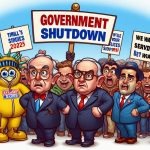The relationship between the U.S. President and the stock market is complex and influenced by various factors. While the President can have an impact on economic policies that affect the stock market, it’s important to note that the stock market is influenced by a wide range of factors, and no single individual, including the President, has complete control over its movements. http://dorianfinance.com/10-ways-to-start-investing
Here are some ways in which a U.S. President may influence the stock market:
- Economic Policies: The President has the power to shape economic policies, such as tax policies, trade agreements, and regulatory frameworks. Changes in these policies can have direct effects on corporate profits and, consequently, stock prices.
- Fiscal Policies: The President works with Congress to shape fiscal policies, including government spending and budget priorities. Government spending can impact various sectors of the economy, and this, in turn, can affect the performance of related stocks.
- Monetary Policy: While the President doesn’t control the Federal Reserve, the President does appoint the chair of the Federal Reserve. Monetary policy decisions, such as interest rate changes, can have a significant impact on the stock market. http://dorianfinance.com/401k-vs-fire-movement
- Global Relations and Trade Policies: Presidential decisions on trade agreements and international relations can influence global economic conditions, which, in turn, affect the stock market. Trade tensions or agreements can impact the profitability of multinational corporations and specific industries.
- Market Sentiment: The President’s rhetoric and communication can influence market sentiment. Speeches and policy announcements can create optimism or uncertainty, affecting investor confidence and, subsequently, market movements.
- Crisis Management: The way a President handles economic crises or unforeseen events can impact market stability. Quick and effective responses may mitigate negative impacts, while indecision or poorly executed policies can contribute to market volatility.

It’s important to recognize that the stock market is influenced by a multitude of factors, including economic indicators, corporate earnings, interest rates, and global events. Additionally, market reactions are often a result of investors’ perceptions and expectations, which can be influenced by a variety of sources beyond the President, such as the Federal Reserve, Congress, and global economic conditions. http://dorianfinance.com/how-to-buy-stocks
Moreover, the stock market is forward-looking, meaning it tends to react to expectations about the future rather than current conditions. As a result, market movements during a particular President’s term might reflect expectations about their policies rather than the immediate impact of those policies. http://dorianfinance.com/how-to-invest-in-your-career-investing-in-yourself










